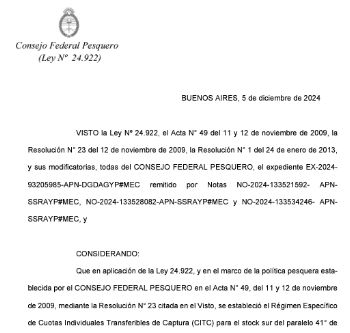|

Photo: Resolución 11 (5-12-24) Asignación CITC m. común
Key decision: Argentina renews common hake quotas until 2039
 ARGENTINA
ARGENTINA
Friday, December 06, 2024, 21:00 (GMT + 9)
"No winners, no losers." The famous phrase that marked the end of Argentina's 1852 Battle of Caseros and brought closure to a bloody conflict between Unitarians and Federalists seems to resonate in the recent decision of the Federal Fisheries Council (CFP). This is how Nelson Saldivia described it in Parte de Pesca.
.png) “Quota holders breathed a sigh of relief. There was relief, not celebration. The Individual Transferable Quotas (CITC) for Merluccius hubbsi have been renewed until December 31, 2039.” “Quota holders breathed a sigh of relief. There was relief, not celebration. The Individual Transferable Quotas (CITC) for Merluccius hubbsi have been renewed until December 31, 2039.”
“The conflict didn’t escalate. The threats of international quota bidding have faded. No one broke the pact of silence surrounding the alleged bribery attempts. The risks of imbalances in provincial quota distribution have been avoided.”
“On Thursday, December 5, 2024, shortly after midday, the renewal of the quota system for common hake was unanimously approved,” highlighted Nelson Saldivia.
Two Ministers Present at the Vote
The significance of this "administrative" decision was evident in the high attendance at the Federal Fisheries Council session, which convened with a quorum of nine out of ten members.
This vote, described by some as "historic," included participation from:
- Juan Antonio López Cazorla, CFP President.
- Martín Fernández and Miguel Schmukler, representatives of the National Executive Power.
- Paola Gucioni, representative of the Ministry of Foreign Affairs.
- Representatives of maritime provinces:
- Javier Rodríguez (Buenos Aires),
- Sergio Paleo (Río Negro),
- Pedro Andrés Arbeletche (Chubut),
- Gustavo Martínez (Santa Cruz), and
- Carlos Cantú (Tierra del Fuego).
Notably, the Minister of Agrarian Development of Buenos Aires and the Minister of Production, Commerce, and Industry of Santa Cruz were also present. Witnesses included alternates Carla Seain, Carlos Liberman, and Ricardo Ancell Patterson.
.png) .png)
Criteria for Quota Renewal
The renewal of CITCs followed criteria similar to those used for the reallocation of quotas for the first three species in September. Allocations and trends recorded since 2010 were considered, with attention to:
- (a) CITCs originally assigned based on historical catches.
- (b) CITC Reassignment Funds.
- (c) Social Reserves.
- (d) Administration and Conservation Reserves.
- (e) Artisanal Reserves.
Updated data from the Enforcement Authority was also included, and the principles outlined in CFP Act No. 49/2009 were maintained for assigning CITCs for the 2025-2039 period.
Changes to the Social Reserve
A notable change was the increase in the percentage of the Social Reserve, which grew from 27.07% of the Maximum Allowable Catch (CMP) established in 2009 to 31.2971% in 2024. The distribution by jurisdiction was defined as:
- 12.0846% for the Enforcement Authority.
- 7.56% for Buenos Aires Province.
- 2% for Río Negro.
- 4.8525% for Chubut.
- 4.8% for Santa Cruz.
The record highlights a request from Chubut and Buenos Aires representatives to assign CITCs from the Social Reserve. The Enforcement Authority will be responsible for issuing the corresponding certificates and ensuring compliance.
.png) “The Social Reserve percentage underwent a modification from the 27.07% established in 2009 to 31.2971% of the CMP. The jurisdictional distribution now stands at 12.0846% for the Enforcement Authority, 7.56% for Buenos Aires, 2% for Río Negro, 4.8525% for Chubut, and 4.8% for Santa Cruz,” explained Karina Fernández from Revista Puerto. “The Social Reserve percentage underwent a modification from the 27.07% established in 2009 to 31.2971% of the CMP. The jurisdictional distribution now stands at 12.0846% for the Enforcement Authority, 7.56% for Buenos Aires, 2% for Río Negro, 4.8525% for Chubut, and 4.8% for Santa Cruz,” explained Karina Fernández from Revista Puerto.
“In the minutes, a request from Chubut and Buenos Aires for CITC allocations from the Social Reserve is noted. It was established that the Enforcement Authority must issue certificates for the corresponding Social Reserve allocation to each jurisdiction and ensure compliance.” . This is how Karina Fernández concluded her article.
The minutes and resolution outlining the new allocation system, effective until December 31, 2039, were published yesterday afternoon. It remains to be seen how stakeholders will react and whether, as in 2009, the decision will be broadly accepted without triggering legal disputes.
[email protected]
www.seafood.media
|



